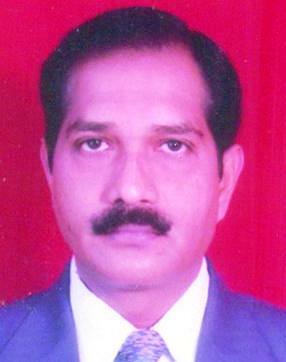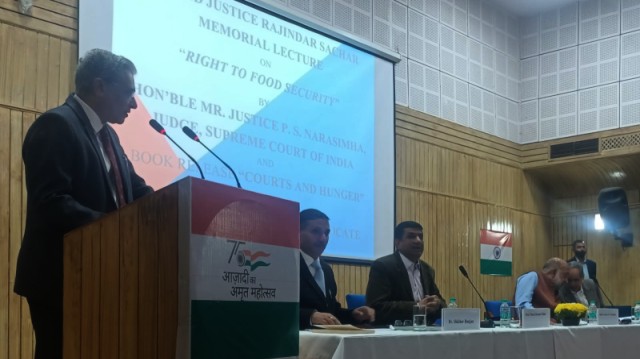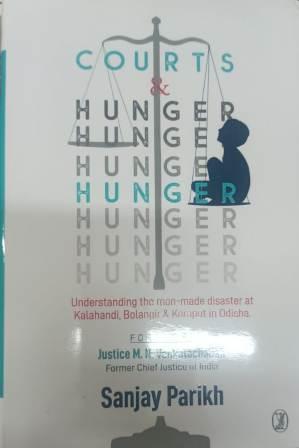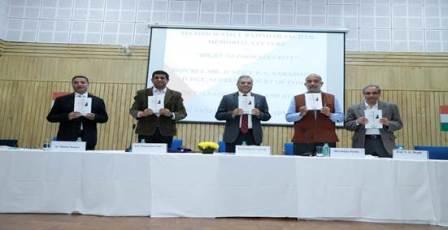

The second Sachar Memorial Lecture organized by Indian Society of International Law on, Right to Food Security was delivered by Hon’ble Justice P.S. Narasimha, Judge, Supreme Court of India at V.K Krishna Menon Bhawan, New Delhi on 8 December.
The first Sachar Memorial Lecture on Human Rights Concern and Challenges was delivered by Justice Madan Lokur. During the program, book on, “Courts and Hunger,” by senior Supreme Court lawyer Sanjay Parikh was also released by Justice Narasimha.

Justice P.S. Narasimha while referring to the book, the ideas behind it and humane effort said that it is the thought that matters and it is the will of a person that translates the thoughts into action. He lauded the role of the author and congratulate him for not just the sensitivity on the issue but also channelisisng that sensitivity forward to find a viable solution.
Justice Narasimha while highlighting the role of the courts said that the story of the Supreme Court particularly with the context of hunger is episodic. This is perhaps in two phases and the time has come for the Supreme Court to go for the third phase in the context of fight against hunger. When we speak about hunger or right to food we generally talk about the need for food and not want of food. And it the need which is not provided to all and that is a matter of concern.
“There is sufficient food or not is an issue of economics. There are lot articles to say that the world has sufficient food. The main concern is how it is distributed. The economic process marginalizes many numbers of people to become hungry and perish. Interesting part for us to consider today is the place the hunger and right to food has in our constitution” Justice Narsimha added.

“When we declare we the people solemnly resolve there is no reference to right created. The solemn resolve is to ensure that no one goes hungry.The first phase of the Supreme Court consideration of this issue and there is a series of judgements where it expanded this expression and declare it to include the right to food. That declaration that there is a right of an individual under our constitution that food is to be provided to him did not really helped the situation. Because that right even after recognition merely turned out as a declaratory. So, then the first phase was rather a recognition and a declaration in nature and one has to proceed further” said Justice Narasimha while speaking on Right to Food Security.
“And stage two came when the court realized simply declaration is not sufficient unless there is an obligation on state because only recognition is not sufficient. Even after the obligation in the second phase has not solved the problem. What we need to understand is that it is not merely an issue of law it is a combination of economics and its legal principles. The economics aspects of it has been researched enormously large number of factors contributed to the situation where the world is today. Is it more or less clear that it is not a production issue it is the distribution of food grains” he said.
On the complexity and nature of the problem, Justice Narasimha said that apart from economic issue there is also legal issue. We can discuss that in two parts: on is the entitlement and the other is duty orientations. Our constitution is primarily a right based primarily it prevents the states from encroaching the fundamental right of the citizens. The vocabulary of the courts is also on the provision of the constitutions obviously right based vocabulary. There needs to be a change in that vocabulary and the usage of the expressions and interpretations as to how constitutional provisions can now be interpreted as an absolute clear obligation on state. In the third phase the Supreme Court has to ensure the implementation of the right to will also have to set the accountability to ensure that all those below the poverty line do no go hungry.
 Sanjay Parikh, senior advocate of Supreme Court while speaking in details about remarkable contribution of Justice Sachar in human rights, civil liberties, his commitments towards communal harmony, his personal and professional journey said, “In his Autobiography, “In Pursuit of Justice’, Justice Sachar had narrated many stories. One incident is quite interesting. In 1955, when father of Justice Sachar was the first Chief Minister of Punjab. Then Pandit Jawaharlal Nehru was invited to have breakfast at the residence. Justice Sachar who was full of socialistic ideas and opposed to certain policy decisions of Pundit Nehru, Shri Sachar politely told his father he will not join them for breakfast. He later felt that it was childish but called it as his useful, genuine and unshakable faith in socialism and social values which he continued to have till his death.”
Sanjay Parikh, senior advocate of Supreme Court while speaking in details about remarkable contribution of Justice Sachar in human rights, civil liberties, his commitments towards communal harmony, his personal and professional journey said, “In his Autobiography, “In Pursuit of Justice’, Justice Sachar had narrated many stories. One incident is quite interesting. In 1955, when father of Justice Sachar was the first Chief Minister of Punjab. Then Pandit Jawaharlal Nehru was invited to have breakfast at the residence. Justice Sachar who was full of socialistic ideas and opposed to certain policy decisions of Pundit Nehru, Shri Sachar politely told his father he will not join them for breakfast. He later felt that it was childish but called it as his useful, genuine and unshakable faith in socialism and social values which he continued to have till his death.”
He, added, “Another instance of his independent thinking was taking up of a case of human rights violation of illegal arrest against the government headed by his father as the chief minister. Credit also goes to his father because he was appreciative of his son for being sensitive on such issues.”
Sanjay Parikh’s book ‘Courts and Hunger’ explores the problem and solutions of hunger, why is hunger and starvation and what are the responsibilities of the Government? What role can the judiciary play as a protector of the constitutional rights of citizens in this regard?
 The book,’Courts and Hunger’, seeks to find answers to all these questions related to widely reported starvation deaths in Odisha’s Kalahandi, Balangir and Koraput (KBK) districts through reporting a decade-long rigorous proceeding before the National Human Rights Commission and the Supreme Court of India.
The book,’Courts and Hunger’, seeks to find answers to all these questions related to widely reported starvation deaths in Odisha’s Kalahandi, Balangir and Koraput (KBK) districts through reporting a decade-long rigorous proceeding before the National Human Rights Commission and the Supreme Court of India.
This book is a complete document investigating similar cases. Renowned social activist Medha Patkar writes about the book – Hunger is an indicator of inequality. And it is not hidden but completely exposed. Most of the causes of hunger are man-made. This book will not only make people aware of the truth of hunger and starvation but will also interpret it from socio-economic roots keeping in mind the national and international legal system.
Human tragedy was man-made: the neglect, inaction and indifference of governance were the major causes of people’s suffering. Amartya Sen’s “Entitlement Approach” was used as a legal basis to recognise the social and economic rights of the poor. The judicially monitored exercise eventually brought about direct changes in these chronologically affected districts and led to significant improvement in the standard of living here.
Today, whether it is the case of migration of workers or the distribution of medicines during a pandemic or the making of social and economic benefits accessible to those living in the remotest regions, the State can efficiently tackle all by adopting a similar systemic approach, by being transparent and accountable and by keeping the welfare of the people as its sole aim and object. The courts too, by being sensitive to their constitutional obligations, can effectively alleviate human suffering. This book shows the way forward.
Professor V.G Hedge, Chairperson, Centre for International Legal Studies, Jawaharlal Nehru University and EC member, Professor Manoj Kumar Sinha, Director Indian Law Institute also shared their views on the book. Family members of Justice Sachar, speakers and organisers also paid floral tributes to late Justice Sachar. ![]()
___________
Also Read:
Centre’s Opaque Auction Rules For Pulses Rip Off Govt Coffers, Help Millers Strike Rich
Need to amend laws like UAPA to provide for punishment for those who slap false cases
Global Arms Trade: Who are the real winners?
Why not 40 pc tickets for women in Punjab and elsewhere?
Punjab – How a deadly cocktail of Agri-Water-Energy nexus going to destroy it?
North Pole and the ideological conflict of RSS & Hindutva
Politics of Symbolism: Dalit Chief Ministers in India

Disclaimer : PunjabTodayTV.com and other platforms of the Punjab Today group strive to include views and opinions from across the entire spectrum, but by no means do we agree with everything we publish. Our efforts and editorial choices consistently underscore our authors’ right to the freedom of speech. However, it should be clear to all readers that individual authors are responsible for the information, ideas or opinions in their articles, and very often, these do not reflect the views of PunjabTodayTV.com or other platforms of the group. Punjab Today does not assume any responsibility or liability for the views of authors whose work appears here.
Punjab Today believes in serious, engaging, narrative journalism at a time when mainstream media houses seem to have given up on long-form writing and news television has blurred or altogether erased the lines between news and slapstick entertainment. We at Punjab Today believe that readers such as yourself appreciate cerebral journalism, and would like you to hold us against the best international industry standards. Brickbats are welcome even more than bouquets, though an occasional pat on the back is always encouraging. Good journalism can be a lifeline in these uncertain times worldwide. You can support us in myriad ways. To begin with, by spreading word about us and forwarding this reportage. Stay engaged.
— Team PT


Copyright © Punjab Today TV : All right Reserve 2016 - 2024 |